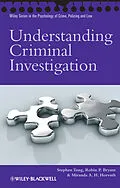This comprehensive volume deciphers investigative process and practice, providing an authoritative insight into key debates and contemporary issues in crime investigations
* Provides critical examination of investigative practice by focusing on the key issues and debates underpinned by academic literature on crime investigation
* Outlines the theoretical explanations that provide an understanding of crime investigation and the context in which investigators operate
* Illustrates the practical relevance of theoretical contributions to crime investigation
* Places clear emphasis on the multi-disciplinary nature of crime investigation
Autorentext
Stephen Tong is Principal Lecturer in Policing at Canterbury Christchurch University. He is currently engaged in developing new and established police programmes and conducting research involving direct mediation in prison. He is also a member of the Higher Education Forum for Learning and Development in Policing.
Robin P. Bryant is Director of Criminal Justice Practice in the Department of Law and Criminal Justice Studies at Canterbury Christchurch University. He has published widely on policing, particularly on the use of intelligence in criminal investigation, and has also advised various police enquiries.
Miranda A. H. Horvath is Senior Lecturer in Forensic Psychology at Forensic Psychological Services, Middlesex University. Her research focuses on sexual violence from an applied social psychological perspective.
Klappentext
Understanding Criminal Investigation presents a critical assessment and in-depth analysis of current investigative practices utilized in the UK. Moving beyond the restrictive framework provided by legal texts, the book instead focuses on key issues and debates surrounding such topics as the history of policing, theories of investigations, and reasoning.
Contributions from a psychological perspective include eyewitness testimony, interviewing and profiling, performance measurement, and the broader impact of the criminal justice system on investigative practice. Other topics addressed include the investigation of sexual offences, the use of forensic science, and issues relating to police and detective training and professionalism.
The book also explores the theoretical underpinnings of detective practices and illustrates the practical relevance of theory in real world crime investigations. Review questions and suggestions for further reading follow each chapter to further enhance understanding.
Utilized in conjunction with appropriate law texts, Understanding Criminal Investigation provides the criminology or forensic psychology student with essential insights into the complex and challenging issues faced by contemporary law enforcement professionals.
Inhalt
List of Figures and Tables vii
List of Abbreviations ix
About the Authors xi
Series Preface xiii
Preface xvii
Acknowledgements xix
1 Introduction: A Brief History of Crime Investigation 1
Stephen Tong
2 Theories of Criminal Investigation 13
Robin P. Bryant
3 Forms of Reasoning and the Analysis of Intelligence in Criminal Investigation 35
Robin P. Bryant
4 Offender Profiling 69
Miranda A. H. Horvath
5 Eyewitness Evidence 93
Miranda A. H. Horvath
6 Investigative Interviewing 115
Lynsey Gozna and Miranda A. H. Horvath
7 Assessing Performance: Quantity or Quality? 135
Stephen Tong
8 Criminal Investigation in Context 171
Stephen Tong, Robin P. Bryant and Miranda A. H. Horvath
9 Professionalising Investigation 197
Stephen Tong
10 Conclusion: Future Challenges in Criminal Investigation 217
Stephen Tong, Robin P. Bryant and Miranda A. H. Horvath
References 223
Index 253
